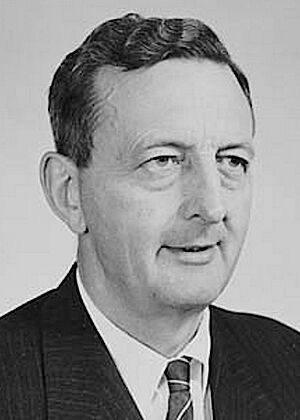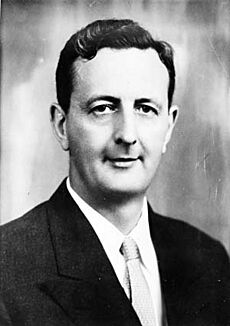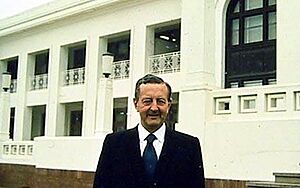Les Bury facts for kids
Quick facts for kids
Les Bury
|
|
|---|---|
 |
|
| Minister for Foreign Affairs | |
| In office 22 March 1971 – 2 August 1971 |
|
| Prime Minister | William McMahon |
| Preceded by | William McMahon |
| Succeeded by | Nigel Bowen |
| Treasurer of Australia | |
| In office 12 November 1969 – 22 March 1971 |
|
| Prime Minister | John Gorton |
| Preceded by | William McMahon |
| Succeeded by | Billy Snedden |
| Minister for Labour and National Service | |
| In office 26 January 1966 – 12 November 1969 |
|
| Prime Minister | Harold Holt John McEwen John Gorton |
| Preceded by | William McMahon |
| Succeeded by | Billy Snedden |
| Minister for Housing | |
| In office 18 December 1963 – 26 January 1966 |
|
| Prime Minister | Robert Menzies |
| Preceded by | Wilfrid Kent Hughes |
| Succeeded by | Annabelle Rankin |
| Minister for Air | |
| In office 22 December 1961 – 27 July 1962 |
|
| Prime Minister | Robert Menzies |
| Preceded by | Harrie Wade |
| Succeeded by | David Fairbairn |
| Member of the Australian Parliament for Wentworth |
|
| In office 8 December 1956 – 11 April 1974 |
|
| Preceded by | Eric Harrison |
| Succeeded by | Robert Ellicott |
| Personal details | |
| Born | 25 February 1913 Willesden, London, England, United Kingdom |
| Died | 7 September 1986 (aged 73) Sydney, New South Wales, Australia |
| Political party | Liberal |
| Spouse |
Ann Weigall
(m. 1940) |
| Alma mater | Queens' College, Cambridge |
Leslie Harry Ernest Bury (born February 25, 1913, died September 7, 1986) was an Australian politician and economist. He was a member of the Liberal Party. He worked in the Australian Parliament from 1956 to 1974, representing the area called Wentworth.
For almost ten years, he was a minister in different governments. He was in charge of Air, Housing, Labour, and Foreign Affairs. He also served as the Treasurer, managing Australia's money.
Contents
About Les Bury's Early Life
Bury was born in Willesden, London, England. His father was an Anglican clergyman. Bury went to Herne Bay College and then Queens' College, Cambridge University. He paid for his studies with scholarships and help from his uncle. He finished university in 1934.
In December 1935, Bury moved to Sydney, Australia. He worked in the economics department of the Bank of New South Wales. He helped the bank's general manager, Alfred Charles Davidson. In 1940, he married Anne Weigall, and they had four sons.
During World War II, Bury joined the army in 1942. He worked with heavy artillery and radar. After the war, he worked for the Australian government's Treasury. From 1951 to 1956, he also worked for the International Bank for Reconstruction and Development and the International Monetary Fund.
Les Bury's Political Journey
Bury became a member of the Australian House of Representatives in 1956. He won a special election for the area of Wentworth. This happened after Eric Harrison, the previous member, left to become a High Commissioner.
Bury was known for being friendly with politicians from other parties. He would attend football games with Labor leader Arthur Calwell. Another Labor politician, Frank Crean, even stayed at Bury's home in Sydney.
Working with Prime Minister Menzies
In December 1961, Prime Minister Robert Menzies made Bury the Minister for Air. He also helped the Treasurer. However, in July 1962, Menzies removed him from this role. Bury had publicly supported the United Kingdom joining the European Economic Community. This idea was against what Deputy Prime Minister John McEwen believed was best for Australia's trade.
In December 1963, Bury returned to the government. He became the Minister for Housing. He introduced the First Home Owners Grant. This program helps people buy their first home and is still used in Australia today.
Working with Prime Minister Holt
In January 1966, Bury became the Minister for Labour and National Service. This was during the Vietnam War. In this role, he was responsible for bringing back conscription. Conscription meant that some young men had to join the army.
After Prime Minister Harold Holt disappeared in December 1966, the Liberal Party needed a new leader. Bury was one of four politicians who wanted the job. He had some support, but he was not well-known to the public. He was not chosen as the new leader. John Gorton became the Prime Minister instead.
Working with Prime Minister Gorton
Bury continued as Minister for Labour and National Service under Prime Minister Gorton. During this time, there were many protests against the war. A common chant at these protests was "lynch Bury and bury Lynch." This referred to Bury and Phillip Lynch, who was the Minister for the Army.
After the 1969 election, Bury was promoted to Treasurer. This was the job he wanted most. He became Treasurer because he supported Gorton in a leadership challenge. The previous Treasurer, William McMahon, had tried to become Prime Minister. Gorton likely thought Bury would support his economic plans.
As Treasurer, Bury presented one budget for 1970–71. He also helped start the "forward estimates" system. This system asks government departments to plan their spending for future years. Bury believed that a country's success should not only be measured by its GNP. He thought that the well-being of everyone in the community was more important. He also supported a broad tax on goods and services, similar to today's GST.
Working with Prime Minister McMahon
When William McMahon became Prime Minister in March 1971, he first kept Bury as Treasurer. However, just 12 days later, he moved Bury to the Foreign Affairs role. Then, in August 1971, McMahon removed him from the government completely.
Bury decided to leave parliament in 1974. He lost the chance to run again for his party.
Later Life and Recognition
Bury retired from parliament in 1974 because of his health. In 1979, he was given an award called the Companion of the Order of St Michael and St George (CMG). This was to recognize his important work for the Australian Parliament.
Les Bury passed away in Sydney in 1986. He was survived by his wife, Anne, and their four sons: Peter, Michael, John, and Nicholas.
 | John T. Biggers |
 | Thomas Blackshear |
 | Mark Bradford |
 | Beverly Buchanan |



